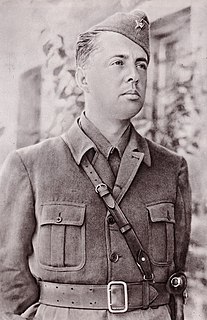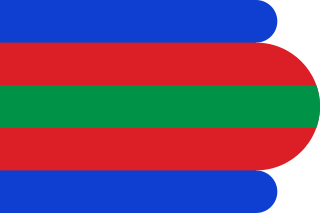
Enver Hoxha was an Albanian communist politician who served as the head of state of Albania from 1944 until his death in 1985, as the First Secretary of the Party of Labour of Albania. He was chairman of the Democratic Front of Albania, commander-in-chief of the armed forces from 1944 until his death. He served as the 22nd Prime Minister of Albania from 1944 to 1954 and at various times served as foreign minister and defence minister as well.
State capitalism is an economic system in which the state undertakes commercial economic activity and where the means of production are organized and managed as state-owned business enterprises, or where there is otherwise a dominance of corporatized government agencies or of publicly listed corporations in which the state has controlling shares. Marxist literature defines state capitalism as a social system combining capitalism with ownership or control by a state—by this definition, a state capitalist country is one where the government controls the economy and essentially acts like a single huge corporation, extracting the surplus value from the workforce in order to invest it in further production. This designation applies regardless of the political aims of the state and some scholars argue that the modern People's Republic of China constitutes a form of state capitalism and/or that the Soviet Union failed in its goal to establish socialism, but rather established state capitalism.

Ramiz Tafë Alia was the second and last leader of the People's Socialist Republic of Albania from 1985 to 1991, served as First Secretary of the Party of Labor of Albania. He was also the country's head of state from 1982 to 1992. He had been designated as successor by Enver Hoxha and took power after Hoxha died. Alia died on 7 October 2011 in Tirana due to lung disease, aged 85.
The Communist League of Great Britain was an anti-revisionist group in the United Kingdom.

The Party of Labour of Albania (PLA), sometimes referred to as the Albanian Workers' Party (AWP), was the vanguard party of Albania during the communist period (1945–1991) as well as the only legal political party. It was founded on November 8, 1941, as the Communist Party of Albania, but its name was changed in 1948. In 1991, the party was succeeded by the Socialist Party of Albania. For most of its existence, the party was dominated by its First Secretary, Enver Hoxha, who was also the de facto leader of Albania.
William "Barbosa" Bland was a British Marxist-Leninist and optician, best known as a proponent of Hoxhaism. Bland was born in Ashton-under-Lyne, Lancashire, and attended Manchester Grammar School. His father was director of a printing works, but lost his job during the Depression, and Bland had to leave school to find work at 15. After a visit to the Soviet Union in 1937, Bland migrated to New Zealand in 1938-39. He returned to England in 1950.
Project Madurai is an open and voluntary initiative to publish free versions of ancient Tamil literature on the Internet. Texts are published in both TSCII, since its launch in 1998 and Unicode formats from 2004. The project was led by Dr. K. Kalyanasundaram, Lausanne, Switzerland and Dr. P. Kumar Mallikarjunan, Blacksburg, Va, USA.

Buddhist economics is a spiritual and philosophical approach to the study of economics. It examines the psychology of the human mind and the emotions that direct economic activity, in particular concepts such as anxiety, aspirations and self-actualization principles. In the view of its proponents, Buddhist economics aims to clear the confusion about what is harmful and what is beneficial in the range of human activities involving the production and consumption of goods and services, ultimately trying to make human beings ethically mature. The ideology's stated purpose is to "find a middle way between a purely mundane society and an immobile, conventional society."

Not to be confused with John Peet (1915–1988), British journalist and defector

The Beylik of Tunis was a largely autonomous beylik of the Ottoman Empire founded on July 15, 1705, after the Husainid Dynasty led by Al-Husayn I ibn Ali at-Turki defeated the Turkish Deys, that controlled what is now Tunisia.

Bruno Eduardo Rodríguez Parrilla is a Cuban diplomat and politician. He has served as Cuba's Minister of Foreign Affairs since 2009.

Ricardian economics are the economic theories of David Ricardo, an English political economist born in 1772 who made a fortune as a stockbroker and loan broker. At the age of 27, he read An Inquiry into the Nature and Causes of Wealth of Nations by Adam Smith and was energized by the theories of economics.

Jordi Sevilla Segura, is a Spanish politician and economist current chairman of Red Eléctrica Group. He was Minister for Public Administration between 2004 and 2007.
Andy Xie is an independent economist based in Shanghai, and the former Morgan Stanley star chief Asia-Pacific economist famous for his contrarian and provocative views. He left Morgan Stanley abruptly in October 2006 when an internal email that he penned was leaked. He derided Singapore as a money laundering centre for Indonesia, and the ASEAN group of nations as a failure.
Center for Economic and Social Development, or CESD; in Azeri, İqtisadi və Sosial İnkişaf Mərkəzi (İSİM) is an Azeri think tank, non-profit organization, NGO based in Baku, Azerbaijan. The Center was established in 2005.
Production for use is a phrase referring to the principle of economic organization and production taken as a defining criterion for a socialist economy. It is held in contrast to production for profit. This criterion is used to distinguish socialism from capitalism, and was one of the fundamental defining characteristics of socialism initially shared by Marxian socialists, evolutionary socialists, social anarchists and Christian socialists.
Burrel Prison is a high security prison located outside the town of Burrel, in northeastern Albania at the District Police Station in Mat with a maximum capacity of 198 inmates. In 2011 the prison housed 182 inmates and employed 120 corrections officers. The one-story structure is divided into three areas covering 21,000 square meters.

Bharatha Lakshman Premachandra was a Sri Lankan politician a former member of the Parliament of Sri Lanka and Adviser to President Mahinda Rajapaksa. He was killed along with his bodyguards during a shootout within the same party rival group allegedly headed by MP Duminda Silva.
The Maoist Internationalist Movement (MIM) was a clandestine revolutionary communist organization based primarily in the United States. MIM claimed to adhere to a radical ideology called "MIM Thought". MIM listed a sole PO box in Ann Arbor, Michigan as its mailing address. Contrary to most Maoist groups in the West, which came from a firmly Anti-Revisionist pedigree out of the traditional Communist Parties, the MIM was a product of elements of the American New Left student movement who formed the New Communist movement.

Socialism in Sri Lanka or Sri Lankan socialism is a political philosophy that is shared by various political parties of the country. Socialist parties, especially the Trotskyist Lanka Sama Samaja Party, have played a major role in the country's history from the time of the Sri Lankan Independence movement. Socialist ideology shaped the principal economic and social policies of Sirimavo Bandaranaike and the Sri Lanka Freedom Party during the 1970s. Several sectors of the economy including banking,insurance and some privately owned estates were nationalized during her tenure.Bread and several esstential items were rationed by the government at the time.









